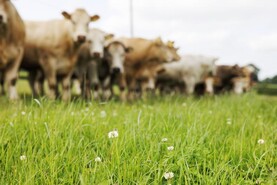Autumn has crept in here over the last fortnight, with misty mornings and the evenings arriving earlier, though the current dry weather has made the seasonal change more bearable in comparison with the last couple of years.
Tractors are still humming around the countryside, whether it’s the last cut of silage being taken, turf being drawn home, slurry going out before deadlines kick in or the annual job of trimming hedges, every minute of daylight is being put to good use as the sun shines.
It is also, however, the season for cattle testing, with many having their annual herd test around this time, ourselves included.
From the vantage point of the cows, it’s nothing more than two days of moving about and two jabs in the neck (hopefully not followed by an eartag), but for the farmers it’s an uneasy period.
Not a happy shed of cows taken in from sunbathing to be TB tested ??
— Karen McCabe (@LadyHaywire) September 17, 2024
Umha gets to meet his first notch in the bedpost again ?? pic.twitter.com/kyR40kLdm8
For a suckler farmer who has strong calves to bring to the mart, dairy farmers with suck calves to sell, or a person in drystock who only buys in for summer grazing, this can create an unwanted winter burden.
Trying to not look at necks or think about lump sizes and yet, at the end of the day it all comes down to a measurement in millimetres which will either fail or pass the herd.
Thankfully ours was all clear, with the added bonus that it was perfect timing to ring our pedigree bull. His first conquest was a last chance effort on a heifer which hadn’t gone in-calf to AI after two attempts and she sailed past her three week mark without even glancing over the hedge for a bull.
We’ve noticed previously that heifers who do not go in-calf on their first insemination can be a problem, but more often than not a natural service will do the trick. With two more cows covered since, it looks like he’ll soon be ready to roll into pastures new for next year.
??Clear test??
— Karen McCabe (@LadyHaywire) September 20, 2024
Worry over for another year!
Umha looks very smart with his new bling now.
Unfortunately our testing date coincided with the Ploughing, so it scuppered my chances of getting away to what must have been a fantastic event with blue skies and sunny weather each day.
While I’ve only ever managed to venture to the actual ploughing part a couple of times, there’s no better place to meet people or check out the latest in anything agriculture related.
I’m beginning to think machines have some form of awareness known only to themselves and emergency mechanics, because it’s nearly always a Sunday or the beginning of a bank holiday weekend that something decides to go wrong with them.
This may be an ability shared with cattle as in my experience, a sunny Saturday where there’s plenty of folk around to help out is just too convenient for them to urgently need veterinary attention.
Not a happy shed of cows taken in from sunbathing to be TB tested ??
— Karen McCabe (@LadyHaywire) September 17, 2024
Umha gets to meet his first notch in the bedpost again ?? pic.twitter.com/kyR40kLdm8
In this case our tractor had been working perfectly all week, until it was needed early Sunday morning. Not a bit of pressure was to be found in the clutch.
Being roughly as good at mechanical matters as I am with performing surgery, the solution to all problems these days (also known as Googling it) was brought into action.
After a fair amount of cursing, mainly about whoever designed the position of the slave cylinder and the valve to bleed it, a leak was discovered.
Or is assumed to be, as from my scant knowledge it’s not supposed to be dripping oil. At least I have an area which can be pinpointed to the mechanic instead of just pointing at the clutch and shrugging my shoulders.






 This is a subscriber-only article
This is a subscriber-only article










SHARING OPTIONS: